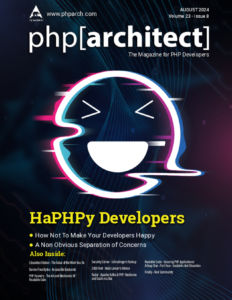We covered how to add static analysis with PHPStan in the previous issue to ensure our code is parsable by the interpreter and to make full use of argument and return type hints throughout our application. Our code is also how we communicate with colleagues and contributors who have to interface, extend, and maintain it. We should put some effort into making it easy for them to understand how it works, trace its execution, and find potential problems. Another valuable tool to reduce friction and boost adoption is to use a formatter or beautifier to enforce some coding standards. We’ll look at PHPCodeSniffer and then explore how we can run it frequently for immediate feedback. by Oscar Merida
So far, we’ve reviewed some attacks a hacker can use, some ways we can think about code to get out of that scenario, and authentication and authorization. This month, we’re delving into Incident Management and Educating Users. by Christopher Miller
If you’ve been writing PHP code in the last five to ten years, there is a high probability that, at some point, you’ve started working with queues. It could be that your team started using queues for async jobs like notifications or data relays to external tools based on user actions. Regardless of why or how you were introduced to them, queues clearly add great value to any application structure. However, if your experience with queues has mostly been limited to Redis or SQS, then you’ll be very happy to learn more about Apache Kafka. Whether it’s real-time data streaming or event-driven integration, Apache Kafka can provide enterprise-level support for any application or set of micro-services. by Matt Lantz
Ask Yourself These Four Questions About Work: 1. Who is the customer? 2. What value is the customer pulling? 3. What is the end-to-end process for any work we do? 4. Where are the bottlenecks? by Chris Tankersly
There is hard work and heartache in planning events, running them, and even making the difficult decision to shut things down. Know that everyone who participated in these events is appreciated, from the organizers to the volunteers to the speakers to the attendees. by Beth Tucker Long
Vienna-born actress Hedy Lamarr, as the teenage wife of arms dealer Fritz Mandl, entertained such heads of state as Adolf Hitler and Benito Mussolini. Thirty years later, her autobiography carried two introductions: one by her medical doctor and one by her psychiatrist. How did she cope? This month, we’re taking a close look at her doctor’s advice–because it applies to us as well. by Edward Barnard
“What!?” I shouted, half asleep into my phone. It was four in the morning, and I was *not* ready to get up. “The server is down. I know it is early … but can you come in and fix it?” by Eric Mann
It is important to remember that achieving accessibility is a process, not a destination. And part of the process includes considering how accessible your backend features are to all users. by Maxwell Ivey
We don’t want happy developers around us! I mean, is there anything more annoying than those code-driven people who sit quietly in the corner, pumping out incredible work while grinning ear to ear because they actually enjoy their jobs? The audacity! Why would anyone want a team that’s passionate, innovative, and driven by a genuine love for what they do? There’s absolutely no benefit to having a bunch of content, enthusiastic developers who actually care about the company’s success, is there? by Christopher Miller






Leave a comment
Use the form below to leave a comment: